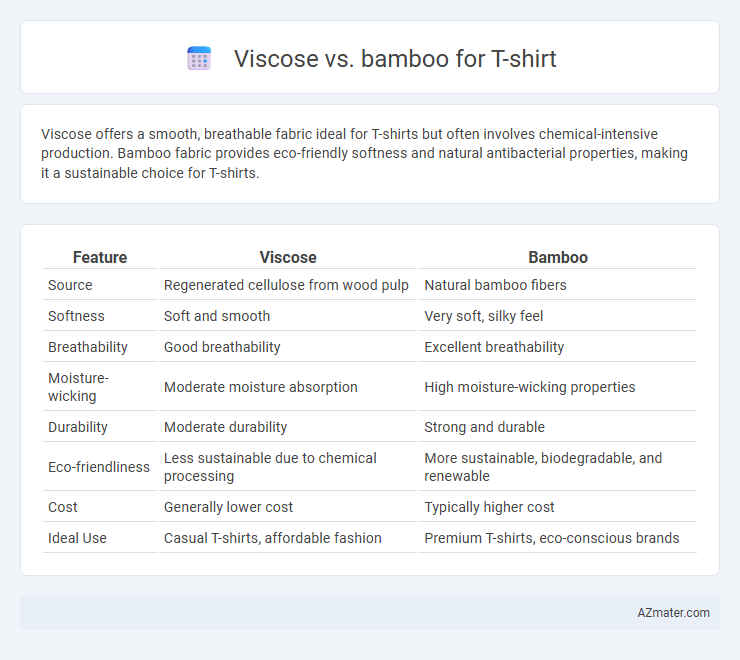Viscose offers a smooth, breathable fabric ideal for T-shirts but often involves chemical-intensive production. Bamboo fabric provides eco-friendly softness and natural antibacterial properties, making it a sustainable choice for T-shirts.
Table of Comparison
| Feature | Viscose | Bamboo |
|---|---|---|
| Source | Regenerated cellulose from wood pulp | Natural bamboo fibers |
| Softness | Soft and smooth | Very soft, silky feel |
| Breathability | Good breathability | Excellent breathability |
| Moisture-wicking | Moderate moisture absorption | High moisture-wicking properties |
| Durability | Moderate durability | Strong and durable |
| Eco-friendliness | Less sustainable due to chemical processing | More sustainable, biodegradable, and renewable |
| Cost | Generally lower cost | Typically higher cost |
| Ideal Use | Casual T-shirts, affordable fashion | Premium T-shirts, eco-conscious brands |
Understanding Viscose: An Overview
Viscose is a semi-synthetic fiber derived from cellulose, typically sourced from wood pulp, making it a popular choice for producing soft and breathable T-shirts. Known for its smooth texture and excellent moisture-wicking properties, viscose offers comfort that rivals natural fibers like cotton. Compared to bamboo fabric, viscose provides a versatile, lightweight feel but often requires careful laundering to maintain durability and avoid shrinkage.
What is Bamboo Fabric?
Bamboo fabric is derived from the pulp of bamboo grass, processed into a soft and breathable textile commonly used for T-shirts. It offers natural moisture-wicking properties, making it ideal for activewear and warm climates. Bamboo fabric is also praised for its eco-friendly production relative to conventional cellulose fibers like viscose, as it requires less water and no harmful chemicals during cultivation.
Manufacturing Process: Viscose vs Bamboo
Viscose fabric is produced through a chemical-intensive process involving cellulose from wood pulp, which is dissolved in chemicals to create a viscous solution before being spun into fibers. Bamboo fabric, often labeled as bamboo viscose, undergoes a similar chemical process to convert bamboo cellulose into fiber, but bamboo's natural growth rate offers a more sustainable raw material source. Both manufacturing methods involve significant chemical treatments, impacting environmental sustainability and highlighting the need for responsible production practices in the textile industry.
Environmental Impact: Which is More Sustainable?
Viscose production involves significant chemical processing and high water consumption, resulting in pollution risks and deforestation when sourced from non-certified wood pulp. Bamboo fabric, while often marketed as eco-friendly, requires intensive chemical treatment to convert raw bamboo into soft fibers, which compromises its environmental advantages. Sustainable sourcing certifications and closed-loop manufacturing processes are crucial in determining the true ecological footprint of both viscose and bamboo T-shirts.
Comfort and Feel: A Wearer’s Perspective
Viscose offers a smooth, silky texture that feels lightweight and breathable against the skin, making it comfortable for everyday wear. Bamboo fabric provides a softer, more natural feel with moisture-wicking properties and enhanced breathability, ideal for sensitive skin and hot climates. Both materials excel in comfort, but bamboo's hypoallergenic and temperature-regulating features often make it the preferred choice for long-lasting softness and coolness.
Breathability and Moisture-Wicking: Performance Compared
Viscose and bamboo fabrics both offer excellent breathability, with bamboo typically excelling due to its natural micro-gaps that facilitate superior airflow. When it comes to moisture-wicking, bamboo outperforms viscose by efficiently drawing sweat away from the skin, keeping the wearer dry during physical activities. Bamboo's anti-bacterial and hypoallergenic properties further enhance comfort, making it a top choice for performance T-shirts focused on moisture management.
Durability and Longevity: Which Lasts Longer?
Viscose T-shirts offer moderate durability but tend to weaken and lose shape after multiple washes due to their semi-synthetic fiber structure. Bamboo fabric, derived from bamboo pulp, exhibits greater strength and resilience, maintaining its softness and form longer through repeated wear and wash cycles. Choosing bamboo T-shirts often results in enhanced longevity and sustained fabric integrity compared to viscose alternatives.
Skin Sensitivity and Allergies: Safety Factors
Viscose and bamboo fabrics are popular choices for sensitive skin, but bamboo has a natural hypoallergenic property that reduces irritation and allergic reactions. Bamboo fibers contain antibacterial agents like bamboo kun, which help prevent skin infections and maintain skin health, making it ideal for allergy-prone individuals. Viscose, a semi-synthetic fiber derived from wood pulp, may involve harsh chemical processing that can cause skin irritation in highly sensitive users, so bamboo t-shirts offer a safer option for skin sensitivity and allergy concerns.
Cost Comparison: Viscose vs Bamboo T-Shirts
Viscose T-shirts generally cost less than bamboo T-shirts due to the more established manufacturing processes and widespread availability of raw materials. Bamboo T-shirts tend to be pricier because of the sustainable cultivation practices and eco-friendly production methods involved. Consumers often weigh the lower cost of viscose against the environmental benefits and softness of bamboo fabrics when making purchasing decisions.
Which Fabric is Better for T-Shirts?
Viscose and bamboo fabrics differ significantly in breathability, softness, and environmental impact, influencing their suitability for t-shirts. Bamboo fibers offer superior moisture-wicking properties and natural antibacterial effects, making them ideal for activewear and sensitive skin. Viscose, often derived from wood pulp, provides a smooth texture but may lack the durability and eco-friendliness associated with bamboo, positioning bamboo as the better fabric choice for comfortable, sustainable t-shirts.

Infographic: Viscose vs Bamboo for T-shirt
 azmater.com
azmater.com